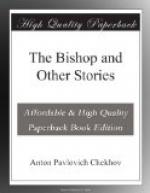While Yegorushka was watching their sleeping faces he suddenly heard a soft singing; somewhere at a distance a woman was singing, and it was difficult to tell where and in what direction. The song was subdued, dreary and melancholy, like a dirge, and hardly audible, and seemed to come first from the right, then from the left, then from above, and then from underground, as though an unseen spirit were hovering over the steppe and singing. Yegorushka looked about him, and could not make out where the strange song came from. Then as he listened he began to fancy that the grass was singing; in its song, withered and half-dead, it was without words, but plaintively and passionately, urging that it was not to blame, that the sun was burning it for no fault of its own; it urged that it ardently longed to live, that it was young and might have been beautiful but for the heat and the drought; it was guiltless, but yet it prayed forgiveness and protested that it was in anguish, sad and sorry for itself. . . .
Yegorushka listened for a little, and it began to seem as though this dreary, mournful song made the air hotter, more suffocating and more stagnant. . . . To drown the singing he ran to the sedge, humming to himself and trying to make a noise with his feet. From there he looked about in all directions and found out who was singing. Near the furthest hut in the hamlet stood a peasant woman in a short petticoat, with long thin legs like a heron. She was sowing something. A white dust floated languidly from her sieve down the hillock. Now it was evident that she was singing. A couple of yards from her a little bare-headed boy in nothing but a smock was standing motionless. As though fascinated by the song, he stood stock-still, staring away into the distance, probably at Yegorushka’s crimson shirt.




